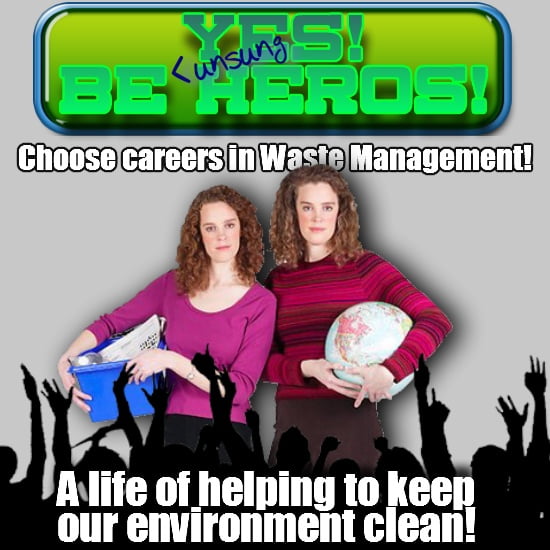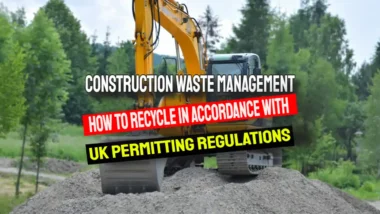 Waste Management Careers were once all about the collection, transporting and disposing of wastes coming from households, industries and other institutions.
Waste Management Careers were once all about the collection, transporting and disposing of wastes coming from households, industries and other institutions.
Now, waste management does so much more, that it has become a huge industry on its own, and it is a growing industry. That means, there are many great opportunities for those that take up waste management careers.
There are still, for example, many companies that offer waste disposal services and haul your junk away. Many of these companies are large and they are good employers, offering a wide variety of different jobs that can become a great career for those that stick at it.
But, now that in many countries close to half of all waste in being recycled and much of the remainder is being incinerated, waste management careers in the big five waste companies span all disciplines, and provide jobs at all levels.
If you still imagine that waste management jobs are limited in any way to waste collection operatives, truck drivers, and their managers, think again, because this is far from the truth!
Welcome to the forefront of environmental innovation and sustainability. In today's rapidly evolving world, the waste management industry stands as a beacon of progress, offering a myriad of career opportunities that extend far beyond traditional bin collection. Whether you're passionate about recycling, fascinated by green technology, driven by engineering challenges, or eager to provide expert consulting, there's a place for you in this dynamic field.
Embrace a Future in Waste Management
Waste management is no longer just about disposing of unwanted materials. It's a sophisticated, state-of-the-art industry that plays a crucial role in protecting our environment, conserving natural resources, and fostering sustainable development. As global awareness of environmental issues grows, so does the demand for innovative solutions and dedicated professionals. By joining this sector, you become a vital part of shaping a cleaner, greener future for generations to come.
Diverse Career Paths in Waste Management
The waste management industry is a multifaceted field offering a wide range of career opportunities. Here are some of the most promising and well-paid roles you can pursue:
1. Recycling Specialist
Recycling specialists are at the heart of waste reduction efforts. They work to develop and implement effective recycling programs, ensuring that materials are properly sorted, processed, and reused. This role involves:
- Designing sustainable recycling systems
- Coordinating with communities and businesses
- Educating the public about recycling practices
- Innovating new methods to increase recycling efficiency
Imagine contributing to a circular economy where waste becomes a resource, reducing the strain on our planet's limited resources.
2. Green Technology Engineer
Green technology engineers focus on developing eco-friendly technologies that minimize environmental impact. They work on projects that harness renewable energy, reduce emissions, and improve energy efficiency. Responsibilities include:
- Designing and testing green technologies
- Collaborating with interdisciplinary teams
- Conducting research to advance sustainable practices
- Implementing innovative solutions in various industries
Your expertise can lead to breakthroughs that revolutionize how we generate and consume energy, driving the shift towards a sustainable future.
3. Environmental Consultant
Environmental consultants provide expert advice to organizations on how to comply with environmental regulations and implement sustainable practices. Their work involves:
- Assessing environmental impacts of projects
- Developing strategies for pollution control and waste management
- Ensuring compliance with local and international regulations
- Advising on sustainability initiatives and corporate social responsibility
By guiding companies towards environmentally responsible practices, you help create harmonious relationships between businesses and the ecosystems they operate within.
4. Waste Management Project Manager
Project managers in waste management oversee the planning, execution, and completion of waste management projects. They ensure that projects are delivered on time, within budget, and meet quality standards. Key duties include:
- Defining project scopes and objectives
- Coordinating resources and teams
- Monitoring project progress and performance
- Managing stakeholder communications and expectations
Your leadership skills will drive the successful implementation of projects that make a tangible difference in waste reduction and resource conservation.
5. Sustainable Supply Chain Manager
Sustainable supply chain managers optimize the flow of materials and products with an emphasis on sustainability. They work to reduce waste, enhance efficiency, and ensure ethical sourcing practices. Tasks involve:
- Analyzing and improving supply chain processes
- Implementing sustainable sourcing policies
- Collaborating with suppliers and manufacturers
- Tracking sustainability metrics and reporting progress
In this role, you can influence entire supply chains, promoting practices that benefit both businesses and the environment.
The Benefits of a Career in Waste Management
Choosing a career in waste management offers numerous advantages:
Competitive Salaries
The specialized nature of waste management roles often comes with attractive compensation packages. As industries continue to prioritize sustainability, the demand for skilled professionals increases, leading to better earning potential.
Job Stability and Growth
Environmental concerns are at the forefront of global agendas, ensuring long-term stability and growth in the waste management sector. Governments and organizations are investing heavily in sustainable practices, creating a wealth of job opportunities.
Making a Positive Impact
One of the most rewarding aspects of working in waste management is the ability to make a real difference. Your efforts contribute to reducing environmental pollution, conserving resources, and promoting sustainable living.
Opportunities for Advancement
The diverse nature of the industry allows for continuous learning and professional development. With experience and expertise, you can advance to higher-level positions, specialize in niche areas, or even start your own consultancy.
Educational Pathways and Qualifications
Embarking on a career in waste management typically requires a strong educational foundation in relevant fields. Here are some common educational pathways:
Degrees and Certifications
- Environmental Science or Engineering: Provides a comprehensive understanding of environmental systems and engineering principles.
- Recycling Management: Specialized programs focusing on recycling processes and sustainability practices.
- Business and Sustainability: Combines business acumen with sustainable practices, ideal for roles like environmental consulting or supply chain management.
- Certifications: Professional certifications such as Certified Recycling Professional (CRP) or Leadership in Energy and Environmental Design (LEED) can enhance your credentials and job prospects.
Skills Development
In addition to formal education, developing key skills is essential for success in the waste management industry:
- Analytical Thinking: Ability to assess complex systems and develop effective solutions.
- Project Management: Skills in planning, executing, and overseeing projects.
- Communication: Clear and effective communication with teams, stakeholders, and the public.
- Technical Proficiency: Knowledge of relevant technologies and software used in waste management.
Emerging Trends in Waste Management
Staying abreast of the latest trends is crucial for anyone pursuing a career in waste management. Here are some of the most influential trends shaping the industry today:
Circular Economy Models
The circular economy emphasizes the reuse and recycling of materials, aiming to minimize waste and promote sustainability. This model encourages businesses to rethink their processes, reducing their environmental footprint while creating economic value.
Advanced Recycling Technologies
Innovations in recycling technologies are making it possible to process materials more efficiently and recycle a broader range of products. Mechanical, chemical, and biological recycling methods are being refined to enhance the quality and usability of recycled materials.
Waste-to-Energy Conversion
Converting waste into energy is a promising solution for managing non-recyclable materials. Technologies like anaerobic digestion and thermal treatment are being developed to harness energy from waste, reducing reliance on fossil fuels.
Smart Waste Management Systems
Integrating IoT (Internet of Things) and data analytics into waste management is revolutionizing how waste is collected, sorted, and processed. Smart bins, real-time tracking, and predictive analytics help optimize operations and improve efficiency.
Sustainability in Supply Chains
Businesses are increasingly prioritizing sustainability in their supply chains, driving demand for professionals who can develop and implement eco-friendly sourcing and logistics strategies.
Success Stories: Inspiring Careers in Waste Management
Jane Smith: From Recycling Coordinator to Environmental Consultant
Jane began her career as a recycling coordinator for a local municipality. Her passion for sustainability and knack for problem-solving led her to develop innovative recycling programs that significantly increased waste diversion rates. Recognizing her expertise, a consulting firm recruited her to advise businesses on implementing sustainable waste management practices. Today, Jane helps companies across the country achieve their environmental goals, making a broader impact than she ever imagined.
Michael Lee: Pioneering Green Technology Engineering
With a background in mechanical engineering, Michael joined a green technology firm focused on developing renewable energy solutions. His work on designing more efficient solar panels and wind turbines directly contributes to reducing carbon emissions. Michael's commitment to innovation has earned him recognition in the industry, and he continues to push the boundaries of what's possible in sustainable technology.
Getting Started: How to Launch Your Career in Waste Management
Embarking on a career in waste management is both fulfilling and impactful. Here’s how you can get started:
Research and Explore
Begin by researching the different career paths available in the industry. Understand the roles, responsibilities, and qualifications required for each. Attend industry conferences, webinars, and workshops to gain insights and network with professionals.
Pursue Relevant Education
Enroll in educational programs that align with your career interests. Whether it's a degree in environmental science, engineering, or a certification in recycling management, gaining the right knowledge and skills is essential.
Gain Experience
Seek internships, volunteer opportunities, or entry-level positions in waste management organizations. Practical experience will not only enhance your resume but also provide valuable hands-on knowledge.
Network and Connect
Building a strong professional network can open doors to new opportunities. Join industry associations, participate in online forums, and connect with professionals on platforms like LinkedIn.
Stay Informed
The waste management industry is constantly evolving. Stay updated on the latest trends, technologies, and regulations by reading industry publications, attending seminars, and participating in continuing education.
Join the Movement Towards a Sustainable Future
The waste management industry is more than just a career choice; it's a commitment to making the world a better place. By pursuing a career in this field, you contribute to vital environmental initiatives, drive innovation, and help shape sustainable practices that benefit both people and the planet.
Take the Next Step
Are you ready to embark on a rewarding career journey in waste management? Explore our job opportunities, connect with industry experts, and discover how you can make a meaningful impact today.
Different waste management businesses would offer jobs as salesmen, customer service representatives, drivers, pickup personnel and field waste characterisation specialists. They are very important in completing the kind of waste management services that homeowners and industry owners need.
However, many waste management careers are also available in brand new waste processing centres which operate state-of-the-art waste treatment equipment. This is high tech equipment and as such requires many professionals to operate, and maintain multi-million pound recycling centres, MRFs, ERFs, incinerators, biogas plants etc.
Increasingly, recycling is enabling materials which are recycled to be re-used may times over. So much recirculation is going on, through recycled materials, that industry experts are calling the new ways of recycling the “circular economy”. As the circular economy develops, those working in the industry will soon cease to see themselves as working with waste materials, instead they are becoming manufacturers of raw materials.
Why Choose a Waste Management Career?
Because it is an interesting business to be in, there are opportunities to rise through the organisation you work for and the salary can be good.
As populations increase, the amount of solid waste will increase. To protect the environment, solid-waste companies pick up this solid waste, compact it, and drop it off in a landfill or recycling facility where it is processed for recycling.
These companies may also create compost out of some biodegradable waste or separate the recyclable waste.
So, as populations continue to increase and the processing of waste grows, a solid-waste company could be a lucrative employment opportunity for you.
How Easy is it to Get a Waste Management Career?
Nobody ever said it would be easy, any career should be full of challenges and a waste management career, is no exception.
If you're ready to commit to joining a team of dedicated, team-driven, operations experts, a front line position could be yours. All you have to do is apply to see if you qualify!
Is it True that a Garbage Man Makes Good Money?
Yes. It can be well paid. However, working as garbage collector or “bin man”, is just one of many of the front line positions available when you take up a waste management industry career. These include all types of drivers, helpers, technicians, maintenance crew members, facility maintenance and upkeep, welders, environmental engineers, and more.
Conclusion – Why Waste Management Careers are Worthwhile
So, to conclude we say that waste management careers are well worth pursuing if you are looking for work. They will always have work to do because businesses, hospitals, and individuals will continue to create thousands of tons of waste every day.
Unless those working in the waste management industry keep providing their services, this waste would pollute the land and water and cause health problems in humans and animals. By following a waste management career you will be helping society by reducing the negative effects of waste, by providing the means for recycling, and in many instances also decreasing overall waste production.
We think think that is a worthwhile career by anyone's standards.
 Important: If you are interested in a waste management job, you should not go to an interview without knowing about what the waste management industry does.
Important: If you are interested in a waste management job, you should not go to an interview without knowing about what the waste management industry does.
You will need to show a basic knowledge of the waste technologies or methods that are used by waste management companies to process waste. Our eBook will be essential reading to help you win that job in the waste management industry so we suggest that you check it out by clicking here.
[First published on 25 March 2014.]







